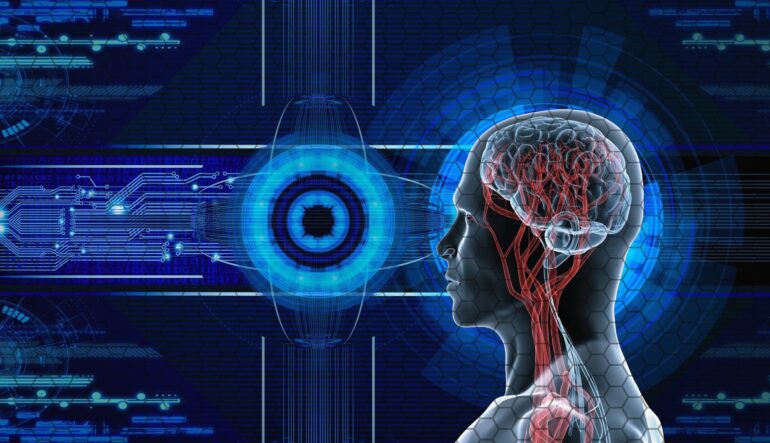TL;DR:
- AI and blockchain are transformative technologies that have gained widespread attention from businesses and tech enthusiasts.
- By combining AI and blockchain, it is possible to develop more advanced and intelligent systems that can analyze data, predict trends, and improve decision-making processes.
- The integration of AI and blockchain in healthcare can transform patient care and data management and improve clinical trials by making the process more efficient, transparent, and secure.
- In the legal industry, blockchain can be used to create smart contracts that are self-executing and enforceable and provide a transparent and immutable record of all transactions.
- Challenges such as privacy and security concerns may arise, but the potential for creating innovative solutions that can transform industries and improve our lives remains significant.
Main AI News:
In recent years, the technological advancements of Artificial Intelligence (AI) and blockchain have been nothing short of extraordinary. AI’s ability to perform tasks that previously required human intelligence and blockchain’s secure and decentralized digital ledger have individually disrupted various industries. However, experts predict that the true potential of these transformative technologies can only be realized when they work together.
The combination of AI and blockchain has already begun to have a profound impact on industries such as supply chain management and financial services. By integrating AI algorithms with blockchain, businesses can develop intelligent systems that can analyze data, predict trends, and improve decision-making processes.
In the field of supply chain management, companies can use AI algorithms to track the movement of goods and ensure they are authentic and not counterfeit. By analyzing data from sensors, cameras, and other sources, real-time insights into the movement of goods along the supply chain can be gained. These insights can then be recorded on a blockchain, creating an immutable and transparent record of the entire journey of a product. This can help reduce the risk of fraud and counterfeiting and increase efficiency in the supply chain.
In the financial services industry, the combination of AI and blockchain has the potential to revolutionize the way transactions are made. Blockchain allows for peer-to-peer transactions without intermediaries such as banks, reducing transaction costs and increasing transaction speed. AI can further enhance these benefits by analyzing the vast amounts of data generated by blockchain transactions. It can identify patterns and predict future trends, making it easier to predict market trends and identify investment opportunities.
Overall, the integration of AI and blockchain is a match made in heaven. It has already disrupted industries and has the potential to create even greater opportunities for innovation. As businesses continue to explore the possibilities of this combination, we can expect to see more transformative changes that will revolutionize the way we live and work.
The integration of Artificial Intelligence (AI) and blockchain technologies has already disrupted various industries, and the healthcare and legal industries are no exception. By using AI algorithms to analyze patient data, healthcare providers can identify patterns and insights that can help diagnose diseases and develop personalized treatment plans. Blockchain can be used to create a decentralized platform that enables researchers to securely share and track clinical trial data. AI can analyze this data, identify patterns and insights, and help researchers develop new treatments and therapies more efficiently.
Moreover, the integration of AI and blockchain can also create new opportunities for innovation in the legal industry. Blockchain technology can be used to create smart contracts that are self-executing and enforceable. They can eliminate the need for intermediaries and reduce the time and cost associated with executing contracts. Blockchain can provide a transparent and immutable record of all transactions, ensuring that all parties involved in a contract have access to the same information, thus reducing the risk of disputes and increasing transparency and accountability in the legal industry.
While challenges such as privacy and security concerns may arise, companies and experts will continue to work towards developing even more advanced and beneficial applications of AI and blockchain. As these transformative technologies continue to evolve, their combined power offers significant potential for creating innovative solutions that can transform industries and improve our lives.
In healthcare, the integration of AI and blockchain can help healthcare providers develop more effective treatments and therapies, leading to improved patient care. In the legal industry, smart contracts can streamline the contract execution process, reducing costs and increasing transparency. As such, the future of the interplay between these two technologies looks promising, and we can expect to see even more exciting developments in the years to come. The healthcare and legal industries, among others, are poised for transformation, and it is up to companies to embrace the possibilities of AI and blockchain and drive innovation forward.
Conlcusion:
The integration of AI and blockchain technologies presents a significant opportunity for businesses across various industries to drive innovation and transform the market. By leveraging the capabilities of AI and blockchain, companies can streamline operations, reduce costs, and provide improved services to their customers.
The potential applications of these technologies are vast, and as businesses continue to explore their possibilities, we can expect to see more transformative changes in the market. Those that embrace these technologies and implement them effectively will have a significant competitive advantage in the years to come.

